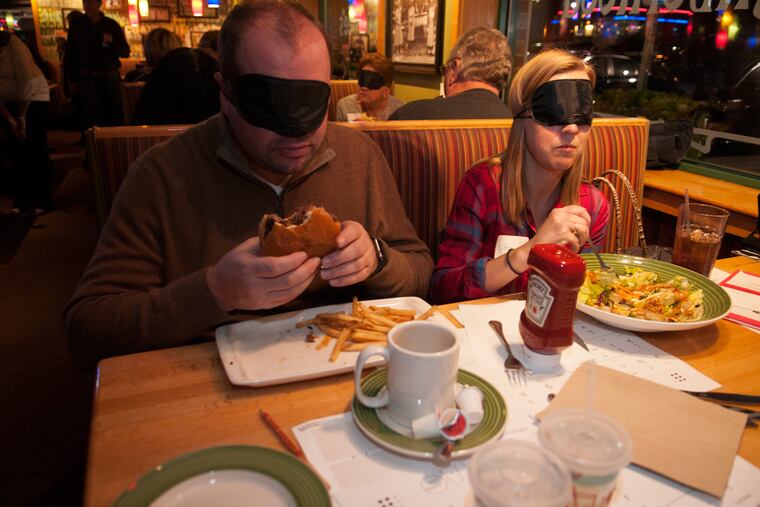Diners gain insights into life for visually impaired
LaToya Thomas was having trouble guiding her hamburger and fries to her mouth. Others were busy with challenges of their own: Salad landed on laps, hands dipped into condiments, and coffee cups on saucers teetered atop spoons.

LaToya Thomas was having trouble guiding her hamburger and fries to her mouth. Others were busy with challenges of their own: Salad landed on laps, hands dipped into condiments, and coffee cups on saucers teetered atop spoons.
Alternately wearing an eye patch, blindfold, and goggles that made one eye blurry and blacked out the other, Thomas joined about 70 students, their family members and friends, and school administrators at the Applebee's restaurant in Thorndale on Monday to get a taste of what students with visual impairments see - or don't see.
Teachers at the Chester County Intermediate Unit had organized the second "Dining in the Dark."
"It really puts in perspective what they've got to go through the rest of their life," Thomas said. "I commend these kids."
Thomas' daughter, Brianna Pratt, was 7 when a stray bullet hit her in the back as the pair walked along a street in Lancaster.
Her brain was deprived of oxygen, damaging her optic nerves. When doctors woke her up after two weeks of sedation, she couldn't see.
"It was very heartbreaking," Thomas said.
Over the next six months, her daughter slowly regained most of her vision "by the grace of God," Thomas said.
Now 17 and living in Downingtown, Brianna wears glasses and sometimes sees spots. She can't see out of the lower part of her right eye.
Charlie Westphal, a 10-year-old with retinopathy, sat a few tables away in a booth surrounded by his blindfolded parents, Jenny and Craig; his 7-year-old sister, Chloe, wearing a furry kitty blindfold; and his best friend, Brandt Berger, 11, who wore goggles that reduced his vision to hole punches of light. Charlie, who lives in Landenberg, can't see out of his left eye and has spots of blindness in his right eye.
"I think it's a lot easier to eat than to do schoolwork," Brandt said.
About 1,200 students in Pennsylvania are in special-education programs for visual impairment, according to the Pennsylvania Department of Education. About 7.4 million people in the United States - 2.3 percent - have a "visual disability," according to 2014 census numbers.
People have been participating in Dining in the Dark-type events for several years. Members of the Maryland-based Foundation Fighting Blindness organize such meals to raise awareness and money for resources and research related to visual impairment. Kutztown University, in Berks County, holds similar dinners to better acquaint students with how to work with people who have visual impairments.
Despite organizers' good intentions, Dining in the Dark events in general raise concerns for the National Federation of the Blind, because of the impressions they might give the public about people who are blind, said spokesman Chris Danielsen.
If sighted people are suddenly deprived of a sense they normally have - which is different from the experience of most visually impaired people - and told to eat with no direction on how to do so, the meal can be upsetting and frustrating to them, he said, arousing a misdirected pity.
"And they think we go through our lives struggling to do everyday things that we actually do quite well every day," Danielsen said.
Kory Krecker, a vision-support teacher with the Chester County Intermediate Unit, came up with the idea for the county's Dining in the Dark as a way to raise awareness and create a support system for students and their parents, who can feel alone in the challenges they face because visual impairments are a low-incidence disability, she said.
The students are often the only ones in their schools with visual impairments. In Chester County, about 0.5 percent of public school students - about 350 - in kindergarten through 12th grade have the disability.
Krecker and fellow teacher Kristen Ohlinger organized Monday's meal, their second Dining in the Dark.
After the first event early this year, some of the students said they felt comfortable using a cane or learning braille after meeting other children like them. At that meal and Monday's meal, parents exchanged contact information and resources.
"It's a huge comfort when you recognize you don't have to figure everything out" on your own, said Tim Ogden of East Bradford, who said the dinner is one of the highlights of the year for his 10-year-old son, Nathanael. His son has Bardet-Biedl syndrome, a genetic disorder that causes retinal degeneration and affects multiple body systems.
Nathanael, who uses a cane in low light, said his favorite part of the dinner is "when the parents get the blindfold. Because it's so unexpected what's going to happen."
610-313-8207 @MichaelleBond